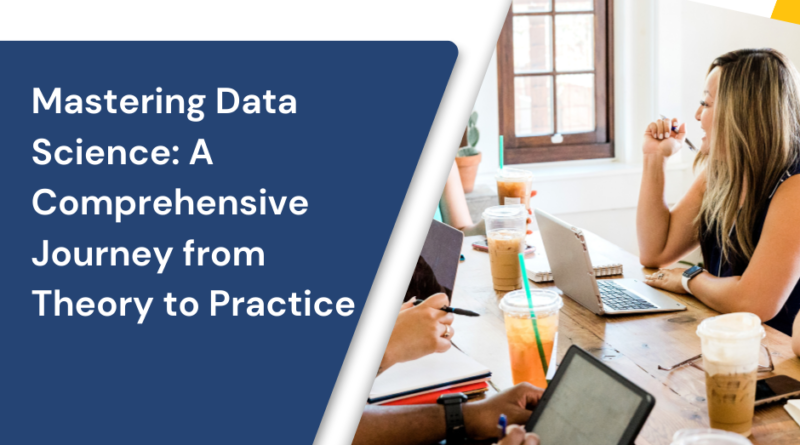Data Science: Theory to Practice Mastery.
Introduction:
Welcome to the dynamic realm of data science, where raw data metamorphoses into invaluable insights, steering decision-making processes across diverse industries. This guide aims to equip you, whether a novice or an enthusiast seeking to delve deeper, with a thorough understanding of the fundamental theories and practical applications of data science, presented in an accessible and comprehensive manner.
Unveiling the Foundations:
Data Science Definition:
Data science epitomizes an interdisciplinary field that amalgamates scientific methodologies, algorithms, and systems to extract actionable insights from both structured and unstructured data sources.
Core Concepts Exploration:
Delve into essential concepts such as data manipulation, feature engineering, model selection, and evaluation metrics, which form the bedrock of the data science process.
Navigating the Data Science Lifecycle:
Data Acquisition Strategies:
Learn diverse strategies for sourcing data from multifarious channels, including databases, APIs, web scraping, and sensor networks, while adhering rigorously to ethical data collection norms.
Data Cleaning and Preprocessing:
Comprehend the pivotal steps involved in cleaning noisy data, handling missing values, and standardizing features to ensure the integrity and quality of your dataset.
Exploratory Data Analysis (EDA):
Dive deep into exploratory techniques like summary statistics, data visualization, and correlation analysis, unveiling intricate patterns, anomalies, and relationships concealed within your data.
Statistical Modeling Mastery:
Master the art of applying statistical techniques such as linear regression, logistic regression, hypothesis testing, and time series analysis to infer insights and make accurate predictions from data.
Exploring Machine Learning:
Embark on a comprehensive exploration of the vast landscape of machine learning algorithms, encompassing supervised learning (classification, regression), unsupervised learning (clustering, dimensionality reduction), and ensemble methods (random forests, gradient boosting).
Model Deployment and Monitoring:
Acquire expertise in deploying machine learning models into real-world production environments, monitoring their performance diligently, and iterating based on actionable feedback garnered from real-world scenarios.
Essential Tools and Technologies:
Programming Languages Proficiency:
Attain proficiency in essential programming languages for data science such as Python and R, leveraging popular libraries like Pandas, NumPy, Scikit-learn, and TensorFlow to expedite your analytical endeavors.
Data Visualization Tools Exploration:
Embark on an exploration of visualization tools and libraries such as Matplotlib, Seaborn, Plotly, and Tableau, empowering you to craft visually compelling representations that effectively communicate insights to diverse stakeholders.
Big Data Frameworks Familiarization:
Familiarize yourself with prominent big data technologies such as Apache Hadoop, Spark, and Kafka, instrumental in facilitating distributed processing and analysis of voluminous datasets.
Real-World Applications and Case Studies:
Business Intelligence Insights:
Delve into the transformative role of data science in powering business intelligence applications such as customer segmentation, market basket analysis, churn prediction, and recommendation systems, fostering data-driven decision-making paradigms.
Healthcare Analytics Exploration:
Explore the pivotal role of data science in healthcare applications encompassing disease diagnosis, medical image analysis, patient outcome prediction, and drug discovery, ushering in a new era of personalized medicine.
Financial Modelling Proficiency:
Understand the nuanced application of data science techniques in finance, spanning risk assessment, fraud detection, algorithmic trading, and portfolio optimization, revolutionising traditional financial paradigms.
Predictive Maintenance Applications:
Unravel the utility of predictive analytics and machine learning in preemptively anticipating equipment failures, optimizing maintenance schedules, and minimizing downtime across diverse industrial sectors such as manufacturing and utilities.
Ethical and Societal Implications:
Data Privacy and Security:
Scrutinize the ethical considerations underpinning data privacy, security, and consent, while navigating through regulatory frameworks such as GDPR and HIPAA that mandate stringent data handling practices.
Bias and Fairness Mitigation:
Address the inherent challenges associated with bias and fairness in algorithmic decision-making, and explore robust techniques for detecting, mitigating, and rectifying bias in both data and models.
Responsible AI Advocacy:
Advocate for the adoption of responsible AI practices emphasizing transparency, accountability, and interpretability, thereby ensuring that data science technologies are harnessed for societal good while minimizing inadvertent ramifications.
Conclusion:
As you embark on your transformative journey into the realm of data science, remember that it transcends mere technical prowess—it embodies a holistic mindset fostering critical thinking, astute inquiry, and judicious utilization of data-driven insights to propel positive change. By assimilating the foundational theories and embracing ethical imperatives, you stand poised to leverage the transformative potential of data science, unraveling novel solutions to intricate challenges and unlocking boundless opportunities in the digital landscape. For the best data science training in Lucknow, Gwalior, Indore, Delhi, Noida, and all locations in India, seek institutions that prioritize comprehensive education, hands-on experience, and ethical considerations to equip you for success in this dynamic field.

